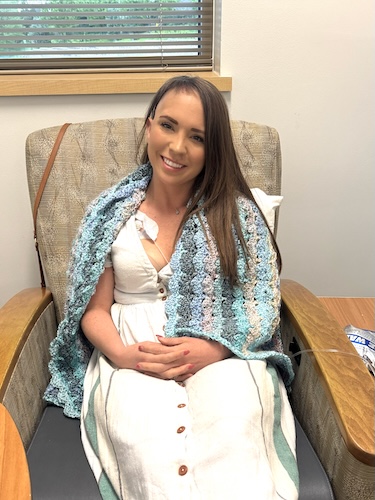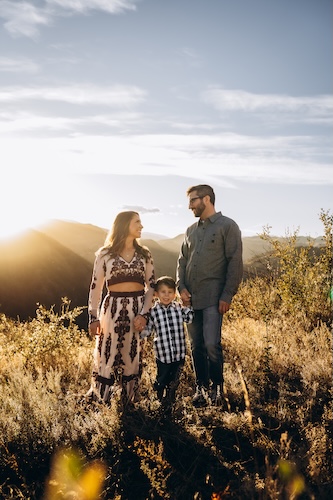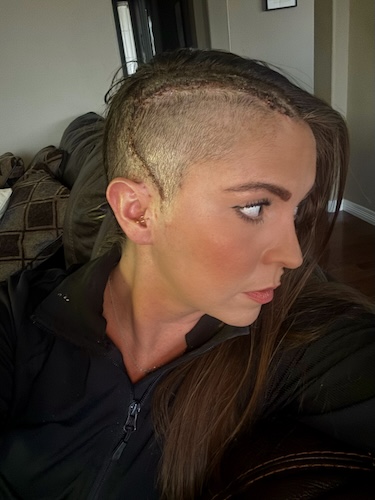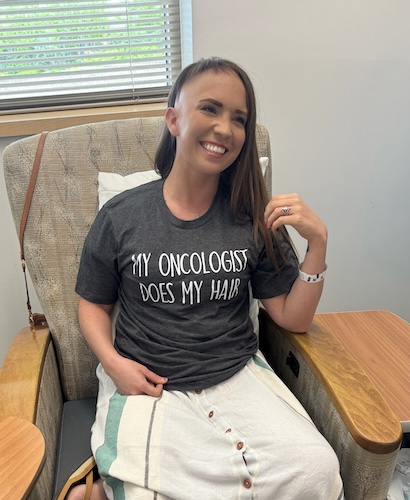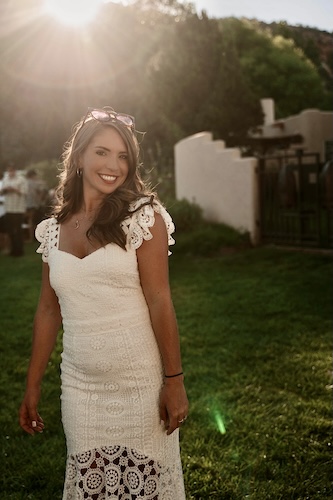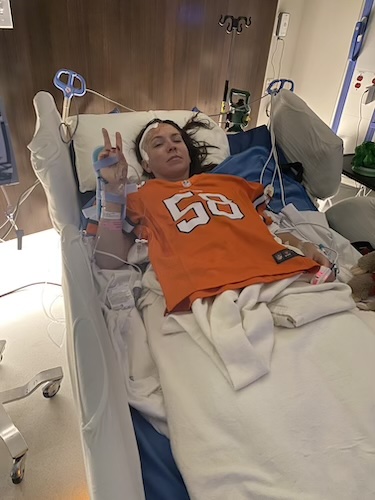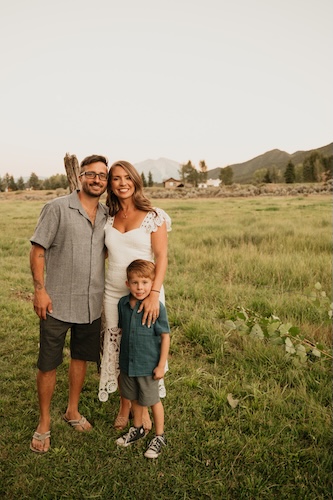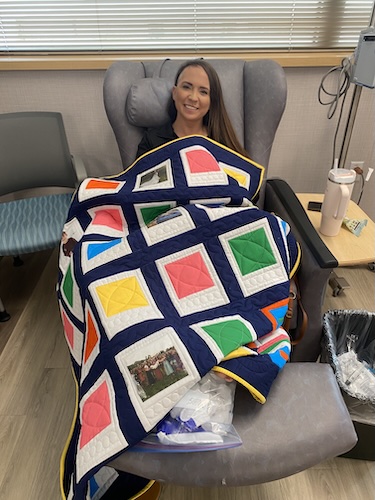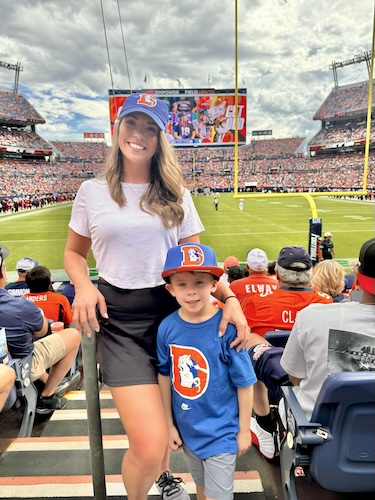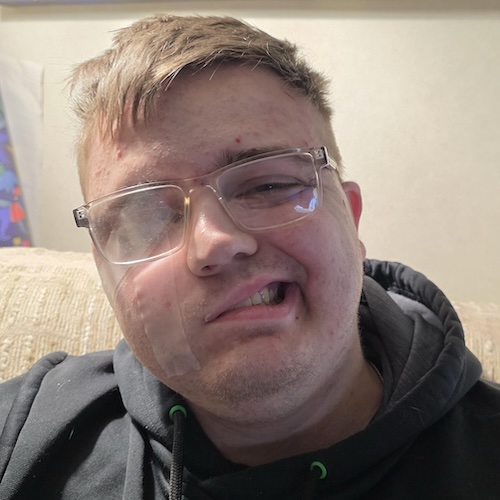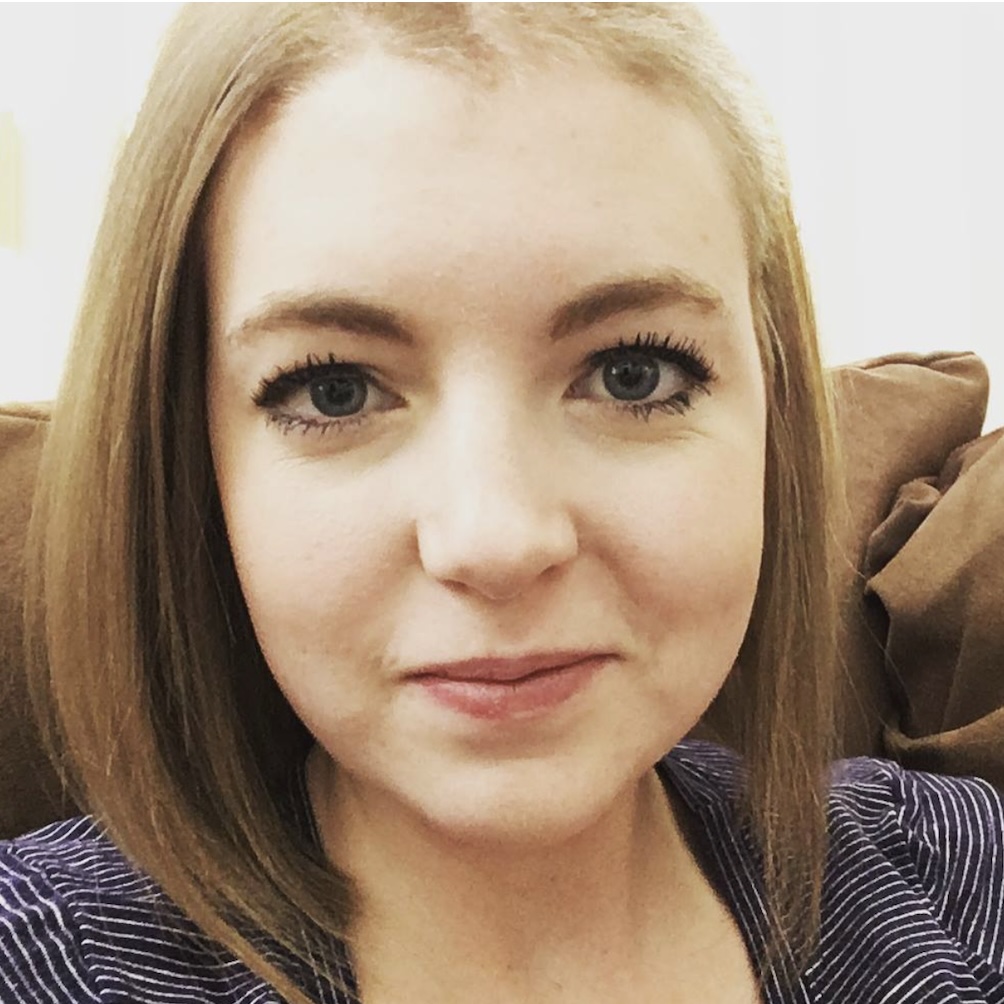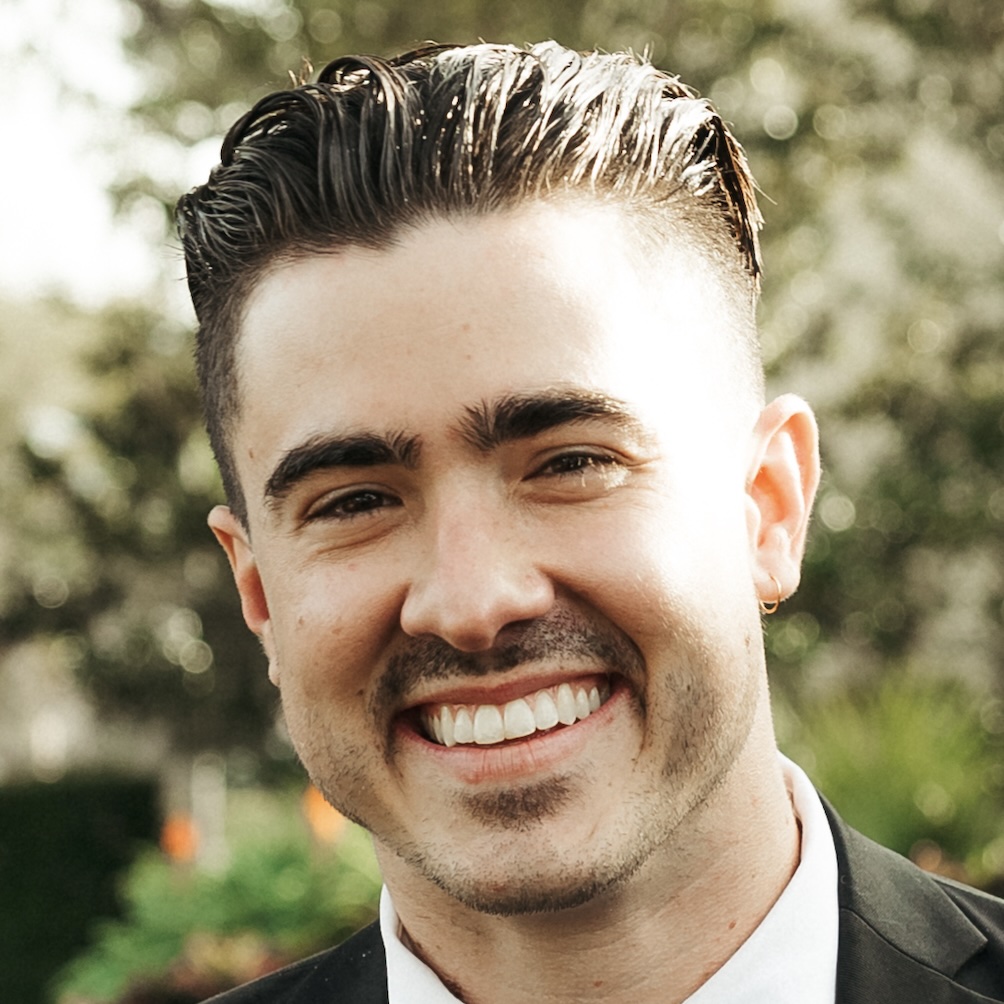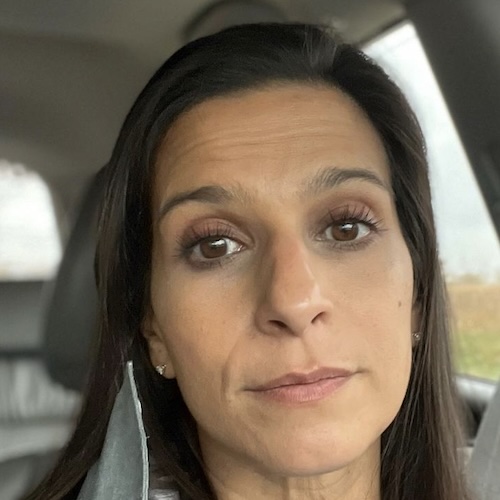Sam Chooses Hope in the Face of Grade 2 Brain Cancer
Sam is a passionate photographer and a proud mom to a six-year-old boy named Felix. Her life took a terrifying turn when a series of seemingly minor symptoms led to a diagnosis of grade 2 brain cancer (astrocytoma with IDH1 mutation).
Interviewed by: Nikki Murphy
Edited by: Chris Sanchez
Sam’s experience began subtly, with feelings of being “off.” She attributed this feeling to holiday stress and the hustle of running her business. She also experienced occasional fatigue and what she thought was food poisoning. But little did she know that things would soon escalate.
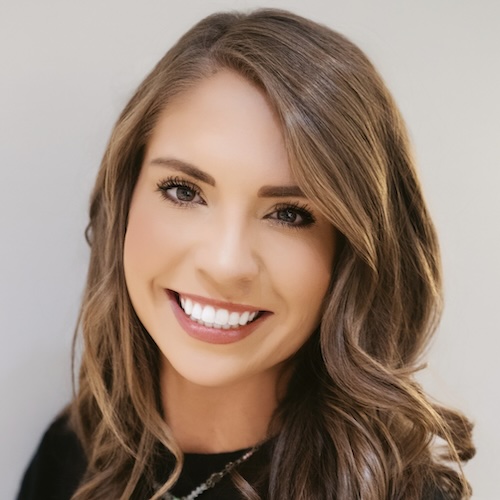
One night, Sam collapsed in her bathroom and suffered what would be the first of many seizures. Her husband acted swiftly, calling 911. She woke up in the ER to the shocking news that they had found a mass in her brain that was causing her seizures. An MRI confirmed the diagnosis, and Sam had to undergo emergency brain surgery.
Grade 2 brain cancer (astrocytoma with IDH1 mutation) had more than just physical effects; it also deeply impacted Sam and her family’s mental well-being. (Editor’s Note: An astrocytoma is a tumor that develops in the brain or spinal cord and grows from star-shaped or astrocyte cells. An IDH1 mutation is a mutation in the enzyme-making IDH1 gene, which can result in cancer.) Sam spoke with her son Felix honestly, aiming to teach him about what was happening to her instead of making him afraid. Her husband was overwhelmed by the sudden shift in their family dynamics. Sam realized the importance of open and honest dialogue, emotional check-ins, and seeking professional support in helping her family maintain its mental health.
After her surgery, Sam had to have radiation treatments and chemotherapy. She found the treatments grueling, given the lifestyle adjustments, dietary restrictions, and emotional hurdles she had to deal with as a result. But through it all, she was still able to find light in the darkest moments, whether through joking with medical staff or cherishing time with her son and husband.
Sam’s message is clear: seek medical advice when something feels off, prioritize self-care, and embrace support from those around you. Watch her video and find out more about:
- How a seizure led to a completely unexpected diagnosis.
- The subtle symptoms Sam thought were due to holiday and work stress.
- How she prepared her young son Felix for really tough news.
- The surprising realities of being awake during brain surgery.
- Why mental health is so vital in cancer care.
Scroll below to read the full transcript from Sam’s interview!
- Name: Sam D.
- Age at Diagnosis:
- 37
- Diagnosis:
- Brain Cancer (Astrocytoma with IDH1 Mutation)
- Grade:
- Grade 2
- Symptoms:
- Consistently feeling overwhelmed
- Seizures
- Treatments:
- Surgery: awake craniotomy
- Radiation therapy
- Chemotherapy
This interview has been edited for clarity and length. This is not medical advice. Please consult with your healthcare provider to make informed treatment decisions.
The views and opinions expressed in this interview do not necessarily reflect those of The Patient Story.
- Hi, I'm Sam
- When I first noticed something was wrong
- What happened next
- The moment everything changed
- How I prepared for surgery
- I was awake during my brain surgery
- I got my results five weeks later
- What my treatment options were
- My treatment plan
- The plan moving forward
- The challenges of my diagnosis
- My message of hope
Hi, I’m Sam
I am a mom to an amazing six-year-old boy. He is the light of my life. I own a photography business that brings me so much joy.
I remember going into the bathroom and brushing my teeth afterward. And I remember setting my toothbrush down, and I very vaguely remember falling backwards. But I don’t remember anything beyond that.
I was so stunned at the entire event. And I think, knowing that when you hear you have a mass in your brain, I don’t think I registered immediately that that meant I have a brain tumor.
When I first noticed something was wrong
I started feeling a bit off. The weekend before I was admitted to the hospital, I started just feeling off, and I thought it was compounding stress. We were in the closing window to Christmas, and we hosted Christmas. My initial thought was that I was just stressed to get to the end of the year. And I had said something to my husband, we were snowboarding that day, and I said, I just don’t feel 100%. I don’t feel like myself. I feel like I’m just too stressed to make commitments. And I think he brushed it off like, yeah, we’ve got a lot going on. And as did I. And then we went back to Denver and stayed. We’re getting ready for the week, the weekend to end into the beginning of the week.
And on Sunday night into Monday we I ended up experiencing what I thought was food poisoning. And I was experiencing that every once in a while for the last few years, and I just assumed that I was maybe developing an allergy to something or developing a food intolerance. But what led me to be sick for a solid four hours? The last time I got up, I fell in my bathroom and fell into a seizure. Thankfully, my husband was home and caught it immediately and called 911 when he realized I was seizing. And that it was a very short time, I think, in the grand scheme of things. And I don’t know if I would have ever assumed that food poisoning like symptoms, and maybe not being able to bear the weight of stress was causing me to, or showing me that I had something going on internally.
What happened next
I got admitted to the hospital. The newest and greatest one, actually, which was really lucky timing for me. I had my seizures around 4:30 in the morning, and I came to between 730 and eight in the morning. And by that time, I was in an emergency room. I was admitted into an emergency room, an actual room. And my husband and son were sitting on the waiting room chair there. And when I woke up, my husband said, Sam, you had several seizures this morning. They did a CT scan when you got here. They found a mass in your brain. They’re prepping you for an MRI, and a neurosurgeon is coming to talk to you.
So that was the first thing I heard when I woke up. And I believe, or I feel like I asked him to repeat that because I was so not only out of it, but extraordinarily confused that I was in an emergency room and had zero recollection of how I got there and the events that led up to it. I went in for my MRI. Very shortly after, the neurosurgeon was in the office or in the emergency room with me. And he said, You have a mass in your frontal right lobe. It is putting pressure on your brain, which is now causing these seizures. You need to have surgery immediately in order to survive.
The moment everything changed
I was so stunned at the entire event. And I think knowing that when you hear you have a mass in your brain, I don’t think I registered immediately that that meant I have a brain tumor. It did take me a little bit of time to become more cognitively aware later that day, and just really sit with the fact that I have a brain tumor and they’re just going to remove it and everything’s going to be fine. And that’s really where my head and positivity came from. And that’s far from the reality of what having a brain tumor really is. And it was a little bit disheartening knowing that reality later.
And as things went on, I think it took me a while to really process what it meant to have a brain tumor and to hear that you have a brain tumor. I had just turned 37 the month prior, so I was just recently I was hitting my late, late 30s and making jokes about getting older. But I believe that getting older is a blessing, and I wasn’t quite prepared to be the youngest person in a treatment center for the condition that I have.
How I prepared for surgery
It was an emergency call to my lawyer to make sure my will and my living will were up to date. And that was really where my stress was. I was making sure that my son Felix was just taken care of if something were to happen to me. His dad’s passing when he was two is incredibly tough. And just him having to go through all that, and him and I together, and then now getting married again last year, just a few months before I found out I had a brain tumor.
I wanted to protect Felix. Even while being in the hospital and being tended to by the nurses and doctors, Felix was there too. I really wanted to make it positive and that being in the hospital wasn’t always scary, and that they are there to help fix the problem, and that that’s what they went to school for. So I’m trying to use that with him to be positive. But I was terrified for him. And later, we had those conversations too. He’s pretty in touch with his emotions and seemed pretty scared. My husband also did. And I think just the burden and weight.
I hate to say burden, but the burden of taking on our entire household and our life all of a sudden at four in the morning, I was suddenly not in the home. I wasn’t able to drive for months and everything, and we had no idea going into it that that was it. But I felt the fear in his voice when he told me, and I can just tell I had felt it over the last few months as we’ve digested and talked about the initial moments and being in the hospital and how much stress that and a burden that he took on himself to go ahead. Just taking it in stride together has been the most positive part.
I was awake during my brain surgery
They admitted me to the ICU and monitored me. And he said that very kindly and humbled me in the thought that I was I could leave and come back. I spent the first part of the week in the ICU taking various medications to make sure I didn’t have any more seizures and doing all the bloodwork, etc. to make sure I had I was properly set up for the procedure. And one thing that came up, because it’s on my right side and I’m left-handed, was that I had to be awake for the craniotomy as well. So I spent he prepped myself that it was going to be two hours for the surgery, that I would be in and awake for the entire surgery for two hours, and then I would be done and on my way. The surgery ended up being about 5.5 hours, and I was awake for the entire surgery.
I was a bit surprised to have surgery awake, as I mentioned. But I also was a bit surprised that I was sitting up the whole time, too. They have your head in a vise, and they kept me sitting upright. And what I remember was the anesthesiologist. I was sedated on my right hand side, and the surgeon was on my left hand side. I’m assuming he was kind of coming this way directionally. If I remember correctly, barely. Thankfully, there was enough sedation that I was lucid in that way. So sitting up, and I could hear everybody talking and you know, reacting to things and their interactions as well in terms of the frustration that I could. I could hear the initial grabbing of the tumor. And that’s why it took a little bit longer. They were hoping to also have initial pathology results back during surgery, and make sure they got as much of the tumor as they could. Generally, you can’t, because it does. If they go too far into the brain matter, they can certainly hurt you more than they can help you at that point, too. And that’s where people end up having dysfunction. I do remember him getting frustrated, and maybe he said that I got a little anxious because I reminded him that the Broncos were still playing every hour.
And they did call my husband and told him. Sam’s still saying that the Broncos are on tonight, so she’s in good spirits and really looking forward to this game. But the surgery itself was a bit shocking to be in and awake and alert for the actual procedure. The most jarring part was actually getting the incision of the bone out, like you’re sawing the bone, because I was awake for that. And there’s no way you can really make that not painful. So that was the most painful part. And my incision goes all the way. I have hair now. All the way around. I have some great pictures of my incision. But it was much larger than I expected. And the picture I took the night before. They did little shaved spots around where they mapped, where the vise was going to hold my head together. Really lovely photos of that, too. I wish I could capture how sad I felt about losing little tiny bits of hair there, where I did lose a large chunk of hair. With it, they shaved this the during surgery, and I lost more with treatment later.
I got my results five weeks later
A little bit of relief came when the doctor came in and he said, You have a grade two astrocytoma and a few mutations with it, one of them being IDH1. And that can be hereditary or it can be environmental. I found out after thinking that I had the hereditary one, that I actually have the environmental one. It can be stress or exposure to toxins and things like that. And there’s no way of knowing when or what toxins or what you can do to avoid that exposure. And the other mutation I have is that it has a very slow-growing brain tumor. I’ve had the actual tumor for years, if not decades. And the astrocytoma, at one point, mutated into that grade of tumor. And that’s likely what the stress and the IDH1 mutation are.
I was in shock. Yeah. And I felt like at that point, especially along the way, and the months following and the weeks before that, I had zero alone time. I most frequently hear that nobody wanted me to be alone if I did fall into a seizure or something happened, or I needed something that I was not able to do yet because I wasn’t able to, like, lift anything heavy or, you know, do a lot of normal, functioning things within the day. So I think the shock was a bit of biggest part of it for me was that I just was like, okay, I do have cancer. Like what’s next? And that I was really more focused on what the path forward is. Like, am I going to die, or is this like what is going to happen? And that is a very hard thing to hear, regardless. I found myself. Later on, any moment that I would be alone, especially in those first few weeks of really processing, I would find my little times to just like, have a little cry, or just shed a few tears just to feel like just to feel. But I didn’t want to. I didn’t feel like I was the doom and gloom, and I didn’t want people to feel sorry for me in that way. I did try to hold it to be a little bit more of a private grieving on that side.
I told my son a few days after I found out that I wanted to make sure it was an educational opportunity for us. I don’t think that when I was six years old that I understood or knew what cancer was or understood the impacts on the close circle. I kind of prepped everybody, and I said, Please don’t cry like I have cancer and have brain cancer. And encapsulated what my treatment plan was going to look like. And the positive side of extending my life and the quality of life. But the hopes that this doesn’t come back. And my husband. That’s a good question. But we were together, and I think he just really held a lot of space for me and just really wanted me to kind of lead with what emotions we wanted. We’ve had some cries. It’s been a hard year. First year of marriage. That’s been compounded on that.
What my treatment options were
One option that I did not get in the hospital before the surgery was you do nothing. Because I believe that before the surgery. And they did believe, too, that if I did nothing, my chances of surviving within days were probably a little to nothing. So, thankfully, my oncologist did say you can do nothing. And live with post-surgery and the chances of recurrence for the brain tumor to grow back, and to be more aggressive, and to ultimately take over. My chances of survival for five years were under 20%. Statistically, and for astrocytoma specifically, they generally have two types of chemo treatments along with radiation. So they do one that’s one, a single pill, and a radiation combination. And the other one is a cocktail of three different types of chemo and a radiation combination. The one with the three different chemos that you take has been around a little bit longer, and they’ve seen a lot of people live into multiple decades. And that one has a lot of research and positive results because it’s been around longer. The other new chemo, like single chemo and radiation, has not been around as long. And that one doesn’t have as much in terms of longevity that they know about yet, because it hasn’t been around long enough that they’ve used it on brain cancer patients.
But the other one seemed a little bit more positive. And I’ve since joined a bunch of brain tumor support groups and specifically for astrocytoma. And several people have lived for multiple decades with astrocytoma and have had the same treatment. So it made me feel much more comfortable going with that route. The oncologist did recommend the chemo route, which I went over the other one, just due to research, but he said both he felt very comfortable saying and hearing your life expectancy going up to 70 percent for over ten years. I measure the time with my son. If I were to pass in under five years, he would lose both of his biological parents before he’s 11 years old. And how was that fair to him? And that’s really what was making me most emotional. Was that fight for him and not putting him in a place in his life that he deserves? Hearing that and just mentally preparing to go through radiation and chemo was a big lift. I did call and make that decision about a week after I found out. And it moved pretty quickly. I was a week later getting fitted with my mask that they put on your face for radiation. And I was in radiation very shortly after. And chemo followed.
My treatment plan
I did kick off my treatment plan with 27 rounds of radiation. It was supposed to be 30, but the doctor had said that that was the higher end of treatment for me. But the way my resection for the brain tumor went and the way my scan looked right before, they felt comfortable reducing the session. I went five days a week, Monday through Friday, into these sessions, which were relatively easy for what they sound like. I enjoyed the nurses and the staff there. We had a good time, and I was coming in with funny jokes instead of saying my birthday every day because we all knew it. We were all friends there. Now that I would say, oh, did you know on my birthday this happened or that this happened that year? Or what was the top song in America? It was a fun way to bring things together in that way.
And about four weeks post, I started chemo. They did break that up. And I do a mixture of three different medications. Day one, it’s four cycles, and each cycle is 42 days long. And within those 42 days, I take three different medications.
One is an IV into our oral pills that I’m able to take at home. Day one is a single medication that I take. And it makes you kind of sick for a few days after. And I experienced quite a bit of nausea. I do manage through nausea, medication, and things that make it a little bit easier. And then I go in and do an IV infusion, and I start another medication for two weeks. And that one’s the most aggressive. I am not allowed to eat cured meats, aged cheeses. Most sauces or soy sauces. Anything that has any alcohol or soy, like any source. In general, I can’t touch rubbing alcohol. So there are a lot of restrictions, and it’s very difficult to eat out. I’ve utilized AI to upload different menus at restaurants and asked, “What can I eat at this restaurant with this medication that I’m taking?”
The plan moving forward
I’ve not had any clinical trial discussions. And my plan moving forward after this, for my understanding, is just to monitor. I’ll be getting MRIs every three months. My last one was in May and had positive signs of progress from the radiation treatment. My next one in three months should be this month in August. And I’ll have one more at the end of the year. So every three months for the foreseeable future, I’ve heard anywhere from 5 to 10 years. So that’s going to be a big stretch of that. But I’m hopeful that is something, and being patient with going every three months, that if anything does happen or anything does recur, we’re able to find it quickly, and maybe mitigate it from being too invasive. I would love not to have brain surgery again. But another fun fact that I found out is that once you find out you have a brain tumor, the chances of recurrence are high. No matter what you do. So I’m hoping that if that does happen, I’m 105 years old and it will be okay. But my other hope is that it just doesn’t. And this is maybe a one-time blip in my earlier life than expected.
The challenges of my diagnosis
My biggest challenge has been being able to live with it comfortably. I have had a full head of hair my whole life, and I think it just changed my appearance so much, especially at the beginning when I was missing all my hair. And I had a very noticeable scar that I couldn’t cover. That I had to really become comfortable with that, or who I was. I found myself very often justifying, like I have brain cancer, or just telling that to somebody. My son even said it to people at school. They’re like, You look so different. Felix’s mom, what’s different about you? And he would even say it. She has brain cancer. Leave her alone. So, whether I want this to be a traumatic event for everybody, it kind of is. I think it’s been hard to come to terms with and hard to keep private, as it’s so physically obvious in my appearance. But I’ve gotten a little bit better, and I’m trying to own it now.
I feel like initially, maybe it’s going to take a little bit of time in this drastic change in my life. Is it just being treated a little bit differently? People started treating me differently or acting as if I were more delicate or needed extra padding around me. I’m very much independent, but I’m also going to push myself in every way I can, and I think the bubble around me, or people hoping to give me the ability or to protect me, has become a big change in my life. Improving that has been a little bit challenging as well. Just being like, I can do this. I’m good. I’m. They said I can do my normal activities. I’m not trying to be extreme by any means. I only got one day of snowboarding in last year, and I’m hopeful that that is not the end of it for me. They promise that I can do all that, but it’s a little bit hard to overcome that aspect as well. Just hearing that somebody had brain surgery. Even my mom, when I called her, said, Wow, I can’t believe how well you’re talking. I just assumed you wouldn’t be able to talk if you had your brain operated on, which I can see is a very valid deduction, but I don’t know if it’s something that we know enough about.
My message of hope
We all go through extraordinarily hard times in life, and if we want to live in or ruminate in the negative and live in that, and it can make us sick, we can go under and live in the stress and the the disheartening feeling of being like, I have a brain tumor, I’m going to die, and this is what’s going to kill me, and it’s the end of the world and living in that is so toxic and so bad for you that living within the positive side of things, or feeling positive and optimistic that you can overpower this and that it’s mind over matter everywhere. And I try to be as mindful of that for myself all the time, losing my husband and becoming an only parent, and then finding out I have brain cancer four years later. I cannot let the burdens and the hurdles in my life take over. What is more positive? And seeing the joy on my son’s face and giving him the best experience in life together, and making memories that last.
I would say if I had one piece of advice for anybody, it would be to take care of yourself. Know that if you’re feeling overwhelmed or stressed, or if something’s not right, it’s okay to just go and get a checkup and look. And maybe that stress can be something else. What most often do we hear? Don’t give yourself an ulcer. Don’t get so stressed. You get an ulcer. But in my world, I’m wondering if I got so stressed that I gave myself a brain tumor. I made my existing brain tumor worse. So. Self-care. Taking care of yourself in every way you can. And that would be my best advice. And finding out and being preventative.

Inspired by Samantha's story?
Share your story, too!
